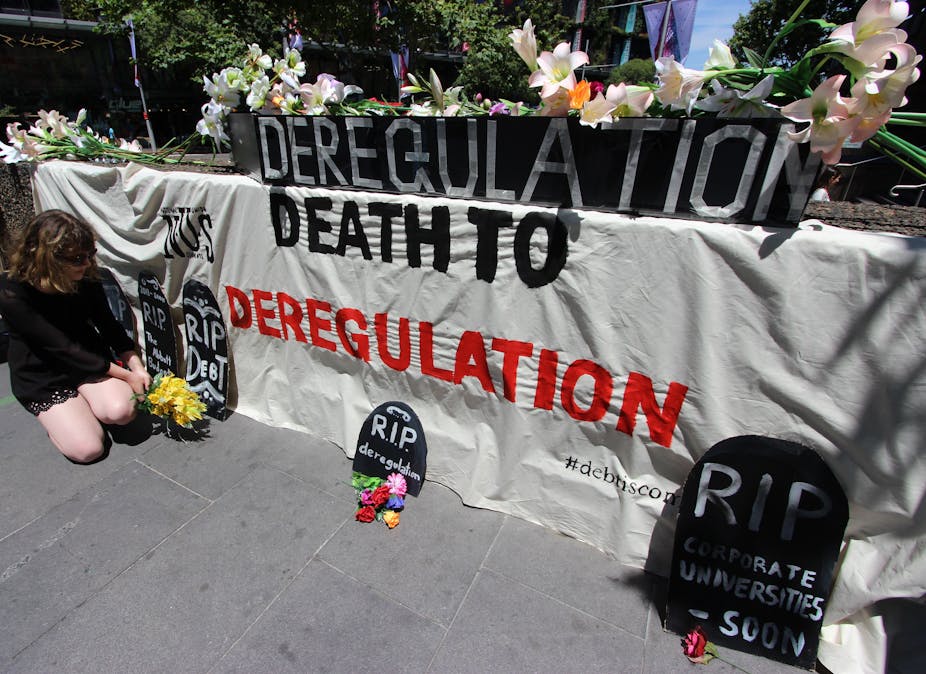Education Minister Christopher Pyne’s scheme for the deregulation of university fees is dead or delayed. Either way it has been exposed as bad for Australia. This is because it will put universities in a spot where they need to increase their fees, continually. They will have to, just to compete with one another on the thing everyone wants: quality.
Improving quality by increasing fees means the cost will eventually outweigh the benefit of going to university. Yet what choice will young people have? If they want a decent job, a large proportion of Australia’s youth will be compelled to pay whatever fees universities charge.
Pyne’s deregulation was a scheme that would hold the middle class to ransom. And if the middle class is in trouble, you can bet it is going to be bad for anyone who falls below that. Those who care about the poor in Australia were rightly appalled: the ideas to compensate for the effect of deregulation on equity groups were tokenistic at best.
The Pyne debacle has, however, exposed other flaws in our higher education system.
We need better advice than the VCs will give
Firstly, any politicians wishing to reform higher education need to speak to people who are not vice-chancellors or deputy vice-chancellors to inform their thinking about what they are doing.
Most VCs probably care for more than their fiduciary obligation to their institution, but few seem to feel that they can really stand for what is good for Australia, as opposed to what is (in the short term) financially good for them.
The support of the VCs was clearly not the support of “the sector”; no-one was fooled by Pyne’s claim that it was.
But that is not the point. Higher education is important. If reform is needed, we need people who are capable of thinking about what sort of university reform would be best for Australia (and the world) beyond their own self-interest.
We need to reform our peak body
Secondly, Universities Australia is nearly wholly useless as it is. University of Canberra Vice-Chancellor Stephen Parker’s scathing comments have been some time coming.
This is a great pity. Since the universities perceived themselves to be competing with one another (and this is mostly perception rather than reality) their ability to work together has been near impossible. I feel for Universities Australia in trying to get them to co-operate; it must be dreadful.
But we clearly need a body that (properly) represents the role of universities in society. If that body is going to have value, it needs to be prepared to explain to government what the effects of its proposals will be on Australia, rather than just weigh up the financial effects for its noisiest VCs.
No one knows how to run a mass university system
Thirdly, the attempt at reform shows that no-one currently knows how to run a mass university system. We cannot as a sector figure out how to properly fund the mass university system until we nut this out.
What do I mean by this? Let us consider:
Is it true that we can not fund a mass system at the same price per head as we could fund an elite system?
What does it really take to educate 40% or more of Australia’s young people at higher levels? Do we think everyone comes into university already knowing how to study?
What are the pathways for students for whom the system was not designed such as low socio-economic, Indigenous and first-in-family students? How do we make it fairer for them?
What does it look like to properly teach all students rather than throw them into the system and reward those who survive (and act surprised when the elite the system was designed for do the best)?
Might it be possible to think creatively about research and teaching loads so that all students, regardless of institution, come into contact with at least some top researchers in their field?
What are the career prospects of academics in a system that seeks to put researchers in some universities and teachers in others?
These questions are just the beginning – they don’t come close to covering some of the most important issues, like academic work-life balance, research priorities, the size and distribution of grants, or whether we need quite so many administrators and glossy marketing brochures.
The point is that reforming universities without seriously asking such questions puts the cart before the horse. Unless we examine the problems of running a mass university system, we can not know how best to fund it.
We need to take this seriously
The purported “$100,00 degrees” are bad for individual families, but are not really the point. Higher education is important for all of us. We need to educate large numbers of young people to be competitive globally and to underpin a humane society. We also need it because knowledge adds to the beauty of the world around us; knowledge is intrinsically good.
This is not even to explore why we need research, though our safety, civility, prosperity, health and possibly even the longevity of the planet depend on it.
Taking higher education reform seriously is not just about “consulting”, it is about thinking. We need people who will do that on behalf of more than their own narrow concerns.

